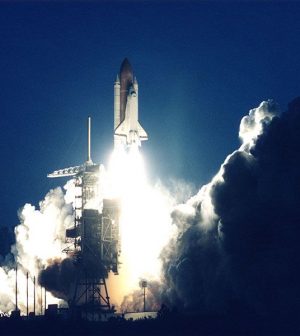- Pandemic Had Only Minor Effect on Young Kids’ Development
- A-Fib More Common in Middle-Aged Folk Than Thought
- What Folks Consider ‘Old Age’ Is Getting Older
- U.S. Measles Cases Reach 125, Surpassing Recent Peak in 2022
- WHO Chief Sounds Alarm on Bird Flu Circulating in U.S. Cattle
- EPA Designates Two ‘Forever Chemicals’ as Hazardous
- Many Parents Cook Special Meals for Little Picky Eaters: Poll
- Relationship With Partner Affects Outcomes for Breast Cancer Survivors
- Parents, Coaches: Help Young Athletes Avoid Summer Heat Hazards
- Hoping to Conceive? Experts Offer Tips to Better Female Fertility
Long Space Flights Could Take Toll on Astronauts’ Brains

Astronauts spending six months or longer in space should stretch their time between trips to three years, warns new research on the impact of space travel on the brain.
To study this, researchers examined the brain scans of 30 astronauts, looking at scans that depicted their brains both before and after their missions.
The research team included missions that were two weeks long, six months long and a full year. Eight of the astronauts were on the shortest missions, four on the longest and the remaining 18 were gone for six months.
“We found that the more time people spent in space, the larger their ventricles became,” said study author Rachael Seidler, a professor of applied physiology and kinesiology at the University of Florida (UF). “Many astronauts travel to space more than one time, and our study shows it takes about three years between flights for the ventricles to fully recover.”
The ventricles are cavities in the brain filled with cerebrospinal fluid. This offers protection, nourishment and waste removal for the brain.
While fluids typically are distributed throughout the body, without gravity that fluid shifts upward. This pushes the brain higher within the skull and causes the ventricles to expand, the researchers explained.
This ventricular expansion is the most enduring change seen in the brain resulting from spaceflight, said Seidler, who is also a member of the Norman Fixel Institute for Neurological Diseases at UF Health.
“We don’t yet know for sure what the long-term consequence of this is on the health and behavioral health of space travelers, so allowing the brain time to recover seems like a good idea,” she said in a university news release.
“The biggest jump comes when you go from two weeks to six months in space,” Seidler added. “There is no measurable change in the ventricles’ volume after only two weeks.”
The researchers said it’s positive that shorter space trips appear to change the brain little, given the interest in space tourism.
It’s also good to know that it appears ventricular expansion levels off after six months, Seidler noted.
“We were happy to see that the changes don’t increase exponentially, considering we will eventually have people in space for longer periods,” she said.
This study could impact future decision-making regarding crew travel and mission planning, Seidler suggested.
The research was funded by the National Aeronautics and Space Administration (NASA). The findings were published online June 8 in the journal Scientific Reports.
More information
NASA has more on human health and performance in space.
SOURCE: University of Florida, news release, June 8, 2023
Source: HealthDay
Copyright © 2024 HealthDay. All rights reserved.









